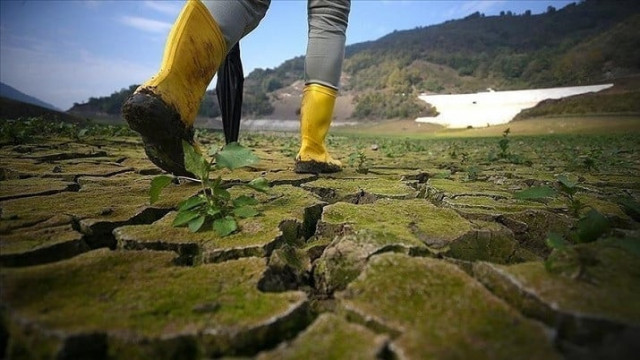Sleep walking into a climate apocalypse
Immediate need is to mobilise private capital to drive shift towards sustainable, green economy

Living in London, I got into the wonderful routine of going out for a daily run; a habit I decided to retain upon returning to Pakistan last year.
However, I soon discovered that this was as hazardous as smoking several packs of cigarettes a day. Karachi’s roads – as with most of Pakistan – are hogged by trucks, tankers, SUVs, and other high-emission vehicles emitting noxious carbon monoxide fumes.
For those unaware, carbon monoxide is a colourless and poisonous gas that can make you seriously ill – and can even prove fatal – if you breathe it in; something I soon discovered. As someone who hardly ever fell sick, losing weight, getting regular stomach bugs, and intermittent coughs have been the norm and the most difficult part of moving back.
Of course, the problem is global; the climate crisis is fast moving towards the point of no return. Recent talks at the COP28 Summit held in Dubai reached a crisis point over the lack of commitment to phase out fossil fuels, eventually coming to an agreement to “transition away”, though climate scientists said the deal was insufficient to keep global heating below the 1.5C Paris limit.
Read Climate-resilient housing
Year 2023 has already seen unprecedented flooding, irregular weather patterns, and wild fires across the world. There were some positives though, including further commitments to the Green Climate Fund and establishment of a $30 billion private investment fund (Alterra) by the UAE to finance climate projects.
The problem is global; but there are countries like Pakistan – which faces increased flooding risks from melting glaciers, amongst other adverse environmental impacts – that bear the brunt (Pakistan is the fifth most climate vulnerable country).
Pakistan’s immediate climate emergency requires a multi-pronged approach and whilst the National Adaptation Plan and NDCs have admirable targets, including 60% of all energy from renewable resources and 30% of all new vehicles to be EVs by 2030, progress has been slow given dependency on international financing.
Today, we Pakistanis are on the cusp of a population and environmental disaster of unprecedented magnitude, with some of the world’s worst AQIs, coupled with critical water and food insecurity, all driven by a host of environmentally hazardous practices.
As of today, more than 90% of plastic waste is still dumped in landfills or incinerated causing toxic fumes. In Karachi alone, sewage is still disposed of into the sea untreated (including by institutions such as the DHA), use of high-pollution carburetted two-stroke engines – over 80% of vehicles on the road – continues to be rampant, and agricultural lands are regularly converted into barren housing societies.
Read The climate crisis is an education crisis
These issues are just the tip of the iceberg that is barrelling towards a national climate disaster of titanic proportions.
Despite this, the dialogue around climate change in Pakistan has continued to focus around either leveraging topical areas, such as driving dollar inflows in the form of damages or meeting large western textile buyers’ requirements, eg, EU’s recently introduced Carbon Border Adjustment Mechanism (CBAM).
What is instead required is a paradigm shift in thinking, towards a private sector-led approach and taking responsibility for the environment around us. This is something that impacts us all; our homes, our families, the air and water we consume, and the marine and wildlife which support our ecosystem. This is not a First World problem; it is in our own backyard.
The immediate need is to mobilise private capital to drive the shift towards a sustainable, green economy, and policies that penalise social externalities. There have been successful examples in Africa and other geographies of climate-tech venture funds investing in business models that drive GHG reductions, including in electric vehicles, IoT, transport, energy, and food and water security. Whilst the clean tech ecosystem is nascent here, there are companies such as MyWater and Mtronic that have come up with globally scalable propositions.
Even oil-exporting countries like Abu Dhabi are moving towards developing sustainable, green economies driven by private investments, as evidenced by the Emirate’s commitments towards building a sustainable future announced at this year’s COP28.
Read ‘Climate financing remains elusive’
The spectrum of measures required to tackle Pakistan’s climate emergency requires collaboration amongst stakeholders across population control, providing incentives for green ventures, better enforcement and a sense of responsibility amongst the citizenry.
One of the biggest contributors is population growth, which is out of control in Pakistan, resulting in increased food and water scarcity, an increasing import bill, and greater use of plastics and polluting vehicles.
I grew up in the time of ‘Bachay Do Hi Achhay’ (Two Children are Sufficient) campaign, procreating at the current rate is unsustainable.
While the climate problems we face may be driven by externalities, the solutions lie at home. And rather than solely relying on outside help, Pakistan must take matters into its own hands.
Each of us must consider whether we have left our planet in a better place for future generations than if we had not been born at all. Ultimately, that will be our true legacy.
The writer is a venture capitalist and climate enthusiast
Published in The Express Tribune, January 8th, 2024.
Like Business on Facebook, follow @TribuneBiz on Twitter to stay informed and join in the conversation.



















COMMENTS
Comments are moderated and generally will be posted if they are on-topic and not abusive.
For more information, please see our Comments FAQ